World
Libyan foreign minister suspended over talks with Israeli counterpart
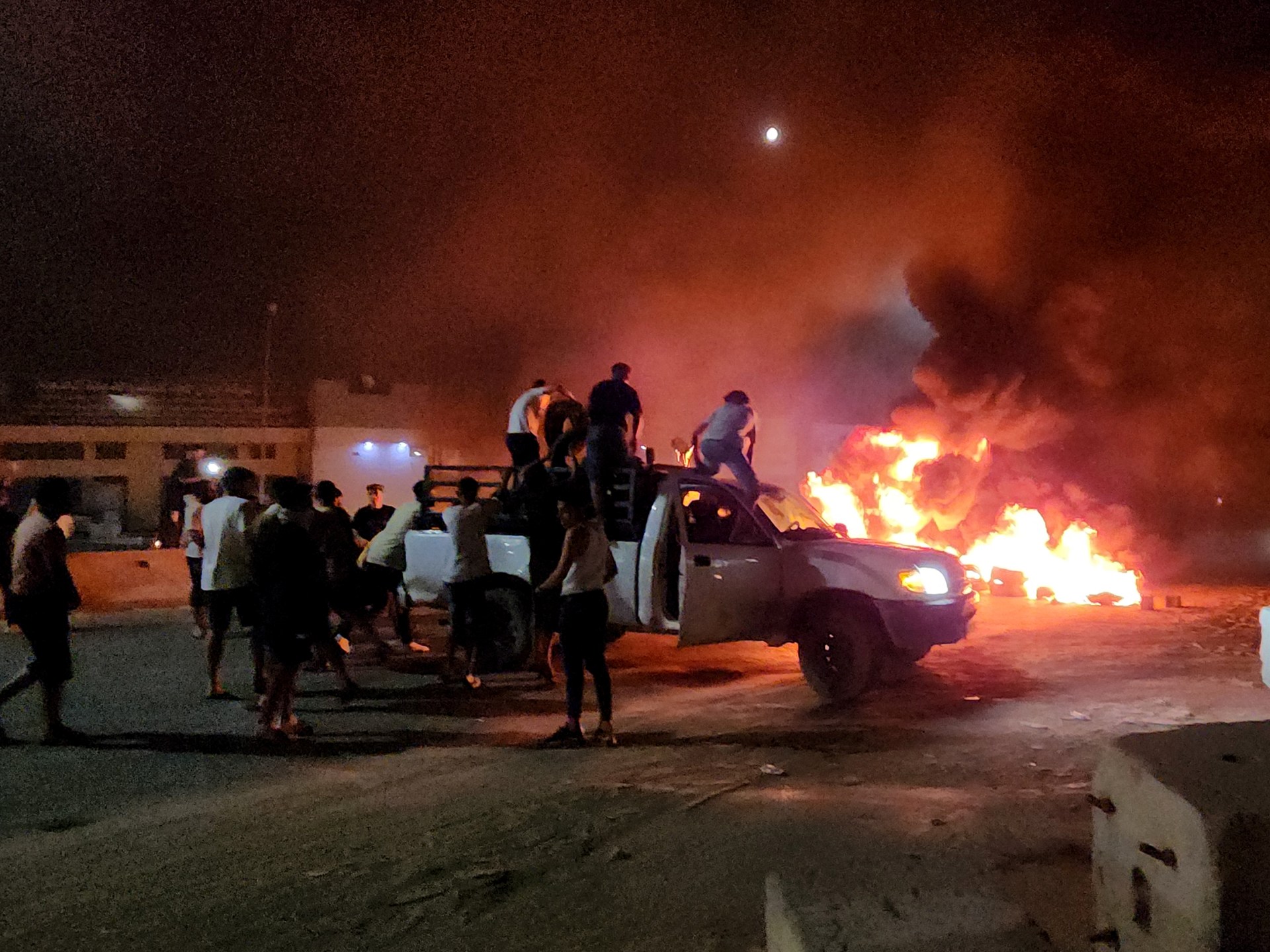
Hundreds of people demonstrated overnight in Libya’s capital and other provinces, angered by reports that the country’s foreign minister met with Israel’s top diplomat last week in Rome.
Videos circulated on social media showed protesters demonstrating in front of the foreign ministry building in Tripoli on Sunday night, calling for Najla al-Mangoush’s dismissal.
Some protesters also called for the resignation of Prime Minister Abdul Hamid Dbeibeh, gathering at his residence in Tripoli and setting fire to it. It was not immediately clear if Dbeibeh was at the residence.
Al Jazeera’s Malik Traina said there is widespread anger in Libya over al-Mangoush’s meeting, with protests starting late on Sunday across the west of the country.
“Protesters in al-Zawiya were calling for the downfall of the entire government due to this meeting, and people were closing down roads and burning tyres in Tajoura and Soug al-Jumaa. We saw other protests in Misrata,” he said, speaking from Tripoli.
Dbeibeh announced al-Mangoush’s “temporary suspension”, replacing her with Fathallah al-Zani, the current youth minister, as interim foreign minister. He added that al-Mangoush would be subject to an “administrative investigation”.
Traina said both legislative bodies, the Tripoli-based High Council of State and the Tobruk-based House of Representatives (HoR), have condemned the meeting and called for an emergency session to discuss it, with the HoR describing the meeting as a “crime committed against the Libyan people”.
An announcement a week later
The political row broke out Sunday after Israel’s foreign ministry said the two countries’ foreign ministers had met the previous week in a meeting hosted by Italian Foreign Minister Antonio Tajani.
“I spoke with the foreign minister about the great potential for the two countries from their relations,” Israeli Foreign Minister Eli Cohen said in a statement from Israel’s foreign ministry, adding that it was the first such diplomatic initiative between the two countries.
Cohen said they discussed “the importance of preserving the heritage of Libyan Jews, which includes renovating synagogues and Jewish cemeteries in the country”, and that “Libya’s size and strategic location offer a huge opportunity for the state of Israel”.
However, the Libyan foreign ministry said al-Mangoush had “refused to meet with any party” representing Israel.
“What happened in Rome was a chance and unofficial encounter, during a meeting with his Italian counterpart, which did not involve any discussion, agreement or consultation,” the ministry said in a statement.
It also accused Israel of trying to “present this incident” as a “meeting or talks”.
The ministry underlined that it “completely and unequivocally rejects normalization with the Zionist formation” and reiterated “in a clear and unambiguous manner Libya’s position regarding the Palestinian cause”.
The North African country does not recognise Israel and does not have diplomatic relations with Tel Aviv. Under a 1957 Libyan law, dealing with Israel is punishable by up to nine years in prison.
Path to normalisation?
Earlier on Sunday evening, Libya’s Presidential Council asked the government for “clarifications”, according to Libya Al Ahrar TV, citing spokesperson Najwa Wheba.
The Presidential Council, which has some executive powers and sprang from the UN-backed political process, includes three members representing the three Libyan regions.
Their request said the meeting “does not reflect the foreign policy of the Libyan state, does not represent the Libyan national constants and is considered a violation of Libyan laws which criminalise normalisation with the ‘Zionist entity’”.
It asked the head of government “to apply the law if the meeting took place”.
According to The Associated Press, an anonymous Libyan government official said the normalisation of relations between Libya and Israel was first discussed in a meeting with Dbeibah and CIA Director William Burns, who visited the Libyan capital in January.
According to the official, Burns proposed that Dbeibah’s government, which is recognised as Libya’s internationally backed government, join the group of four Arab countries that normalised relations with Israel under the US-brokered Abraham Accords in 2020.
The Libyan premier gave initial agreement but was concerned about public backlash in a country known for its support for the Palestinian cause, the official said.
On Monday, an Israeli official told the Reuters news agency that the meeting between al-Mangoush and Cohen was agreed in advance “at the highest levels” in Libya and lasted more than an hour.
Separately, Israel’s former foreign minister and prime minister Yair Lapid criticised Cohen for going public with the sensitive meeting.
“Countries of the world this morning are looking at the irresponsible leak of the meeting of the Israeli and Libyan foreign minister and asking themselves: Is it possible to manage foreign relations with this country? Is it possible to trust this country?” Lapid said in a statement.
Israel has normalised relations with some Arab countries in recent years as part of US-backed deals known as the Abraham Accords.
However, Prime Minister Benjamin Netanyahu’s hardline government has come under intense criticism from Arab states because of surging violence in the occupied West Bank and for backing the expansion of Jewish settlements in the occupied territory.

World
Richard Linklater on Trump’s Film Tariff Threat: ‘That’s Not Going to Happen, Right? That Guy Changes His Mind Like 50 Times in One Day’

Richard Linklater sounded off on Trump’s tariff threat on foreign-made films during the Cannes press conference for his new film “Nouvelle Vague,” saying: “That’s not going to happen right?”
Linklater shot “Nouvelle Vague,” which chronicles the making of Jean-Luc Godard’s “Breathless,” in France. When asked if he had any thoughts on Trump’s recent threat to impose a 100% tax on films made outside of the U.S., the director doubted the viability of the proposal.
“The tariff thing, that’s not going to happen right? That guy changes his mind like 50 times in one day,” Linklater said. “It’s the one export industry in the U.S., it would be kind of dumb to… Whatever, we don’t have to talk about that.”
On if it has become more expensive to make films in the U.S., Linklater said: “I think the true indie film, the no-budget film, has cost the same for the last 60 years. It’s always about how much you have, so that doesn’t change much.”
Zoey Deutch, who plays “Breathless” leading lady Jean Seberg in the film, then chimed in to say that “it would be nice to make more movies in Los Angeles.”
“The history and the studios and the culture and the crews, it would be so beautiful,” she said. “I just finished doing a movie there and it was magical in the same way that Paris is magical and has this history. I would love for there to be more movies in Los Angeles.”
Linklater agreed and added that he “really admires” the French for “taking care” of their film industry. “They make sure it’s healthy and they nurture it and they help it. The government, everyone is all in,” he said. “From production to distribution, they care. And our country, the U.S., could use a little bit of that.”
“Nouvelle Vague” premiered at Cannes on Saturday night to an enthusiastic ovation. Guillaume Marbeck stars as Godard in “Nouvelle Vague,” with Aubry Dullin playing “Breathless” star Jean-Paul Belmondo. The movie is Linklater’s first project shot in French. Variety’s Owen Gleiberman called the movie a highlight of the 2025 festival, writing: “Guillaume Marbeck is so perfect as Jean-Luc Godard he’s uncanny. And so is the whole movie.”
Elsewhere in the conference, Linklater reflected on the current state of cinema, saying that he’s “optimistic” due to the passion he’s seen from young people, who he called the “Letterboxd generation.”
“Cinema is optimistic — it has to be,” Linklater said. “It always feels under attack, you know? I’ve had movies out for over 30 years now and it’s always, ‘Things are terrible, it’s tough.’ And it is tough, it’s a struggle — but it always has been.”
He continued: “There’s new threats, but there’s something perpetual. We like stories told to us, we like the format of feature films. There’s more films than ever being made, indie films, it’s just harder to get them seen. But we adapt.”
World
Pope Leo says family based on ‘union between a man and a woman,’ defends dignity of unborn
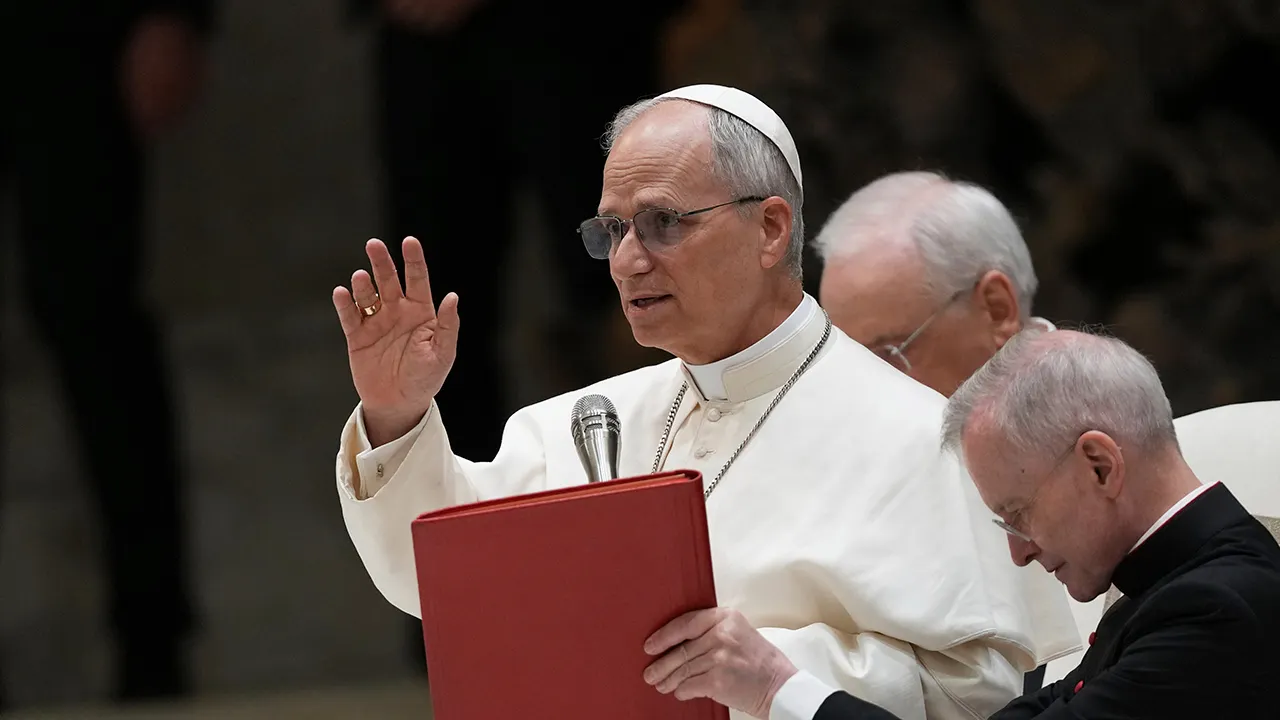
World, media react to election of Pope Leo XIV
OutKick writer Mary Katharine Ham and Democratic strategist Kevin Walling join MediaBuzz to discuss the election of Pope Leo XIV, the first American pope in history, and the U.S. trade deal with the U.K.
Pope Leo XIV has affirmed traditional Catholic doctrine regarding marriage, saying that it is founded on the “stable union between a man and a woman.”
The pope, who was elected to lead the Catholic Church on May 8, was making his first major remarks as pontiff during a private audience with the Vatican’s diplomatic corps on Friday, where he also stressed the inherent dignity of the frail and vulnerable, including the unborn, elderly and immigrants.
“It is the responsibility of government leaders to work to build harmonious and peaceful civil societies,” the pope said. “This can be achieved above all by investing in the family, founded upon the stable union between a man and a woman.”
While Pope Francis also said the Church could not accept same-sex marriage, conservatives accused the late pontiff of sowing confusion among the faithful by being more welcoming than his predecessors to LGBTQ people and approving the blessing of individuals in same-sex relationships.
Pope Leo XIV speaking with members of the Diplomatic Corps on a number of topics including family (Vatican Media)
FOOTBALL LEGEND LOU HOLTZ CALLS ON CATHOLICS TO ‘DEFEND AND ENCOURAGE’ POPE LEO XIV
Pope Leo, the first American to lead the Catholic Church and a member of the Augustinian order, reaffirmed the Church’s position against abortion, called for protection of religious freedom and said he would continue to pursue inter-religious dialogue.
“No one is exempted from striving to ensure respect for the dignity of every person, especially the most frail and vulnerable, from the unborn to the elderly, from the sick to the unemployed, citizens and immigrants alike,” Leo said.
The gathering with the Vatican’s diplomatic corps is standard protocol following the election of a new pope and allows him to greet representatives of world governments ahead of his formal installation Mass on Sunday. Vice President JD Vance, Secretary of State Marco Rubio and Ukrainian President Volodymyr Zelenskyy, along with many other world leaders, will attend the mass, the Vatican said.
In emphasizing dignity for immigrants, Pope Leo noted that his own family had immigrated to the United States. His remarks could lead to friction with President Donald Trump, who seeks to deport millions of illegal immigrants from the U.S. Trump and Pope Francis also publicly clashed on immigration.
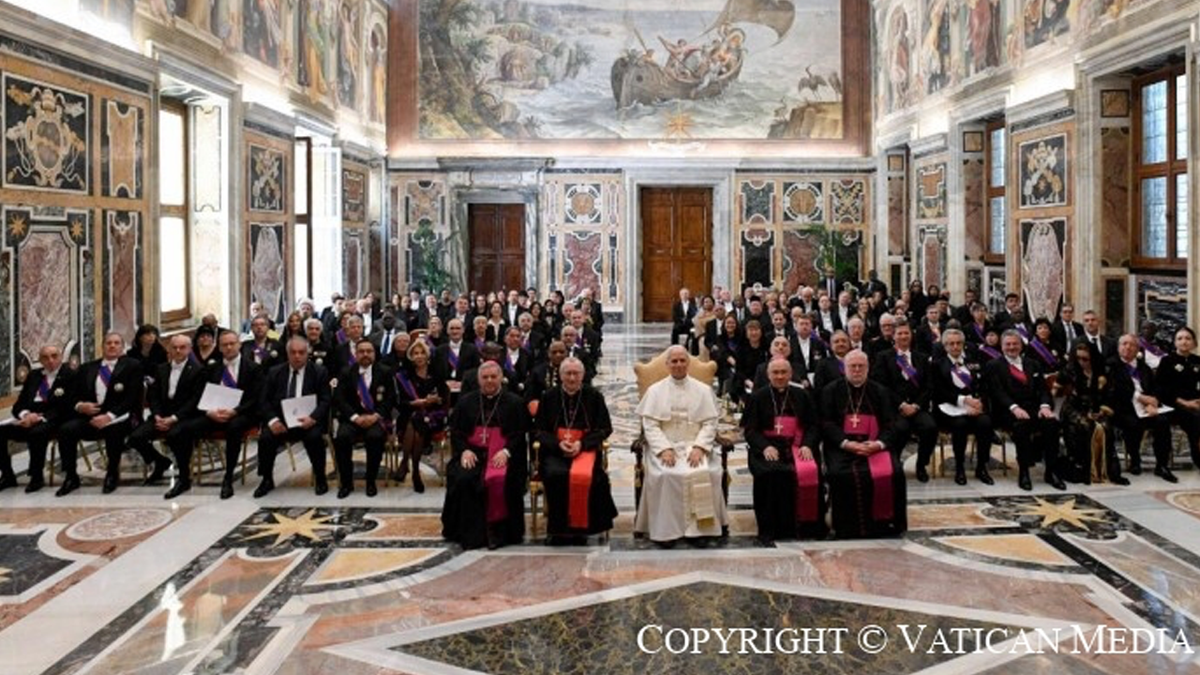
Pope Leo XIV meets with the Diplomatic Corps prior to his inaugural mass. (Vatican Media)
MEDIA POSITIONS POPE LEO XIV AS POTENTIAL ‘COUNTERWEIGHT’ TO TRUMP
“My own story is that of a citizen, the descendant of immigrants, who in turn chose to emigrate,” Pope Leo told ambassadors at the Vatican.
“All of us, in the course of our lives, can find ourselves healthy or sick, employed or unemployed, living in our native land or in a foreign country, yet our dignity always remains unchanged. It is the dignity of a creature willed and loved by God,” he added.
Pope Leo’s father was of French and Italian descent, while his mother was of Spanish descent.
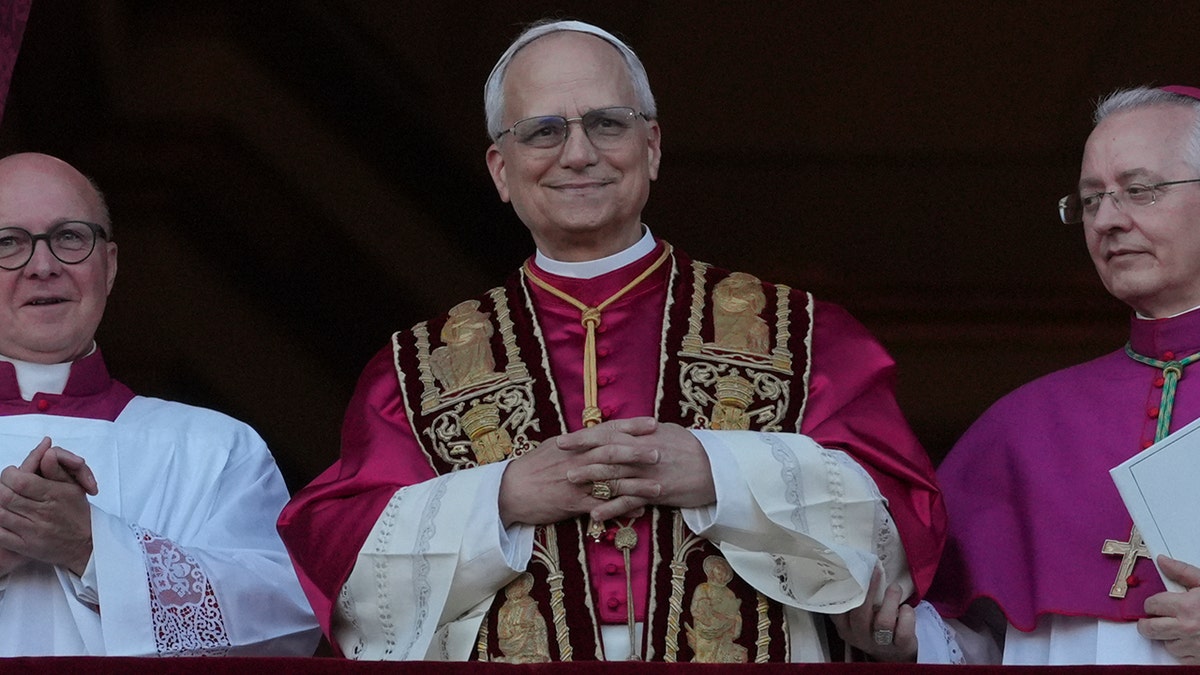
Pope Leo XIV appears at the balcony of St. Peter’s Basilica at the Vatican, on May 8, 2025. (Andrew Medichini/AP)
Pope Leo called on attendees to keep in mind three essential words – “peace,” “justice” and “truth” – and said that they represent the pillars of the church’s missionary activity and the aim of the Holy See’s diplomacy.
Truth, for instance, he said, “does not create division, but rather enables us to confront all the more resolutely the challenges of our time, such as migration, the ethical use of artificial intelligence and the protection of our beloved planet Earth.”
“These are challenges that require commitment and cooperation on the part of all, since no one can think of facing them alone.
Reuters and The Associated Press contributed to this report.
World
Severe storms kill at least 21 across US Midwest and South
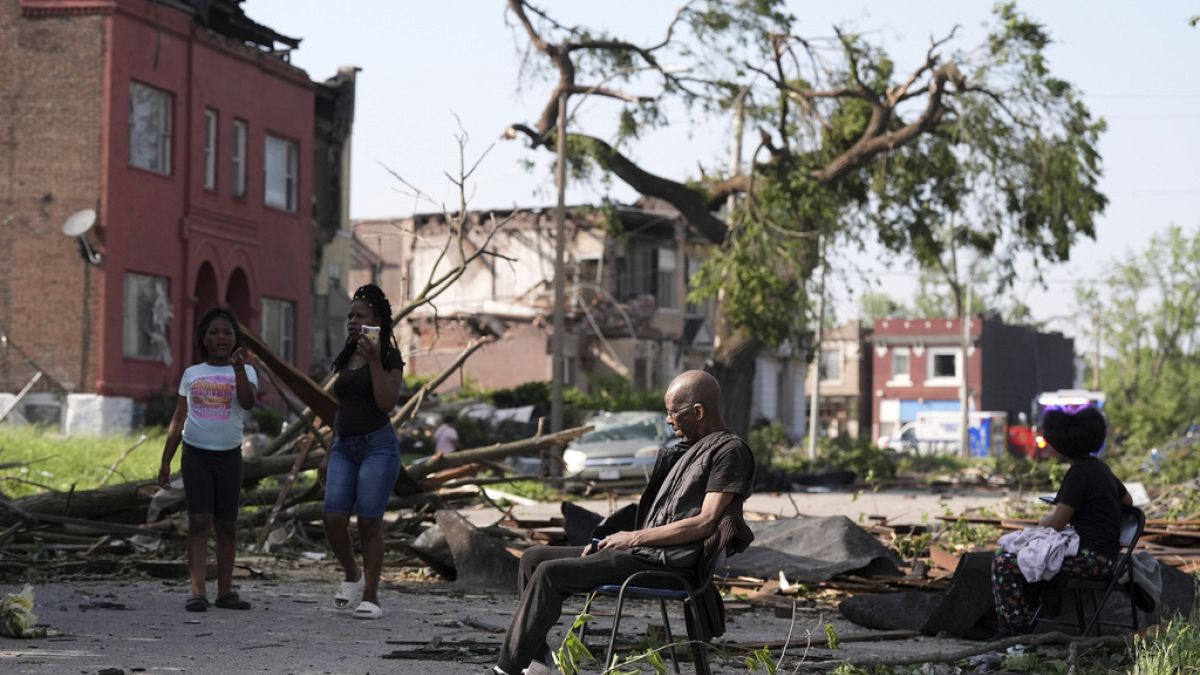
Severe weather sweeping across the American Midwest and South has left at least 21 people dead, with officials warning that the death toll may rise.
In Kentucky, at least 14 people were confirmed dead, with local authorities saying nine people were killed after what appeared to be a powerful tornado touched down in the south-eastern part of the state.
Structures collapsed, and a car was flipped on a motorway as the storm ripped through the largely rural area. Authorities said there were also multiple reports of serious injuries.
While the US’s National Weather Service has not yet confirmed that it was a tornado which struck Kentucky, meteorologist Philomon Geertson said it was likely.
“Lives have been changed forever here tonight. This is a time we come together, and we pray for this community,” said the mayor of London, Kentucky, Randall Wendle. “I have never personally witnessed what I’ve witnessed here tonight.”
Only two months ago, severe weather caused at least 24 deaths and widespread damage in Kentucky. Hundreds had to be rescued during that storm.
Missouri pounded by storms
At least seven people were killed in neighbouring Missouri and tornadoes were also triggered in Wisconsin by the severe weather.
More than 600,000 homes and businesses across a dozen states lost power as of Saturday, with Missouri and Kentucky among the hardest hit.
St. Louis mayor Cara Spencer confirmed the deaths of at least five people in the city and said more than 5,000 homes were damaged.
“This is truly, truly devastating,” she said. “The loss of life and the destruction is truly, truly horrendous.”
The city’s fire department said three people had to be rescued after part of a nearby church collapsed, but one of these people died. A curfew was imposed Friday night in the neighbourhoods damaged the most.
The US National Weather Service said tornadoes also hit Illinois, with more severe weather conditions expected all the way to the Atlantic coast.
The total number of injured was not immediately available. However, hospitals in area reported receiving dozens of injured – some in serious condition.
Additional sources • AP
-

 Austin, TX1 week ago
Austin, TX1 week agoBest Austin Salads – 15 Food Places For Good Greens!
-

 Technology1 week ago
Technology1 week agoNetflix is removing Black Mirror: Bandersnatch
-

 World1 week ago
World1 week agoThe Take: Can India and Pakistan avoid a fourth war over Kashmir?
-

 News1 week ago
News1 week agoReincarnated by A.I., Arizona Man Forgives His Killer at Sentencing
-

 News1 week ago
News1 week agoWho is the new Pope Leo XIV and what are his views?
-
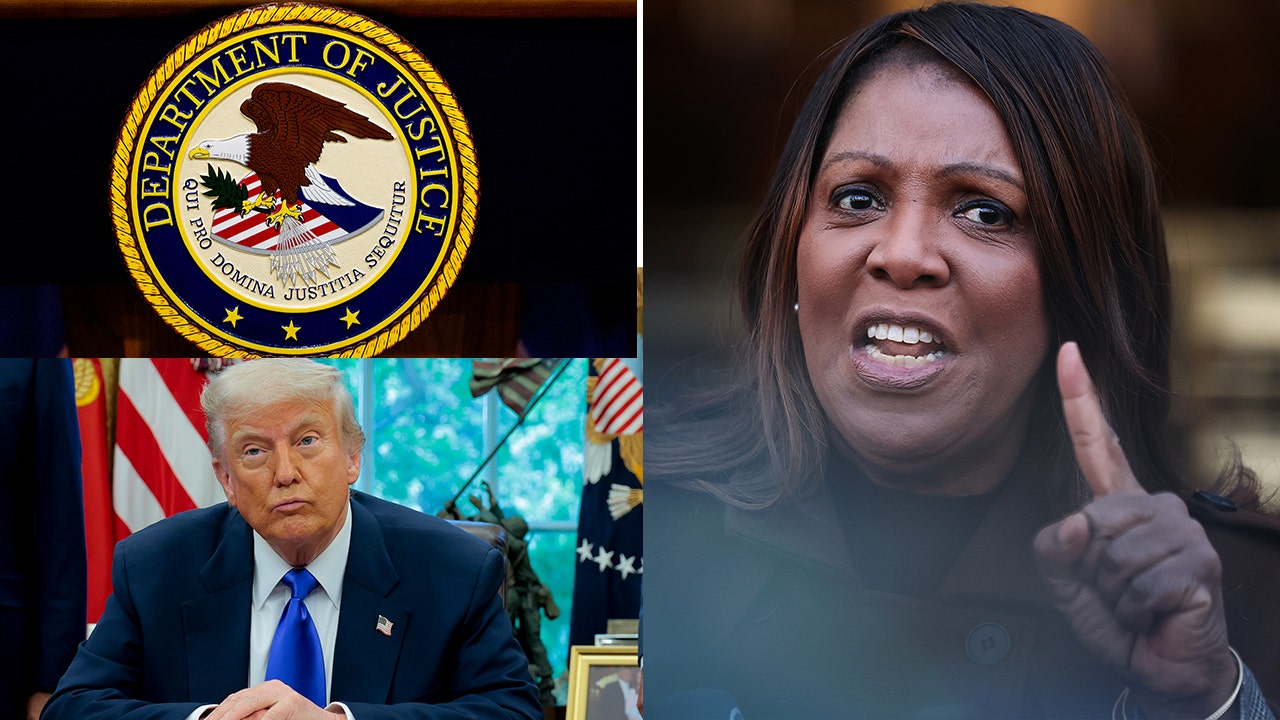
 Politics1 week ago
Politics1 week agoDepartment of Justice opens criminal investigation into NY AG Letitia James
-
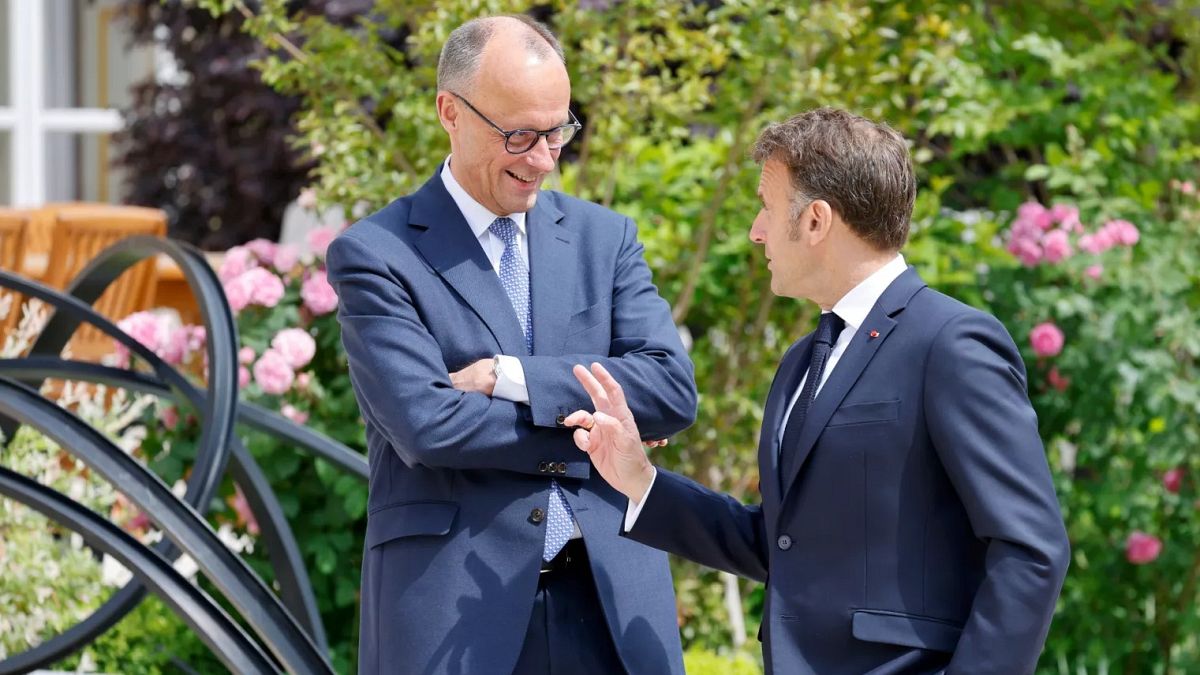
 World1 week ago
World1 week agoNew German chancellor aims for stronger EU ties with France and Poland
-

 News1 week ago
News1 week agoJudge Orders Release of Rumeysa Ozturk, Tufts Student Detained by ICE















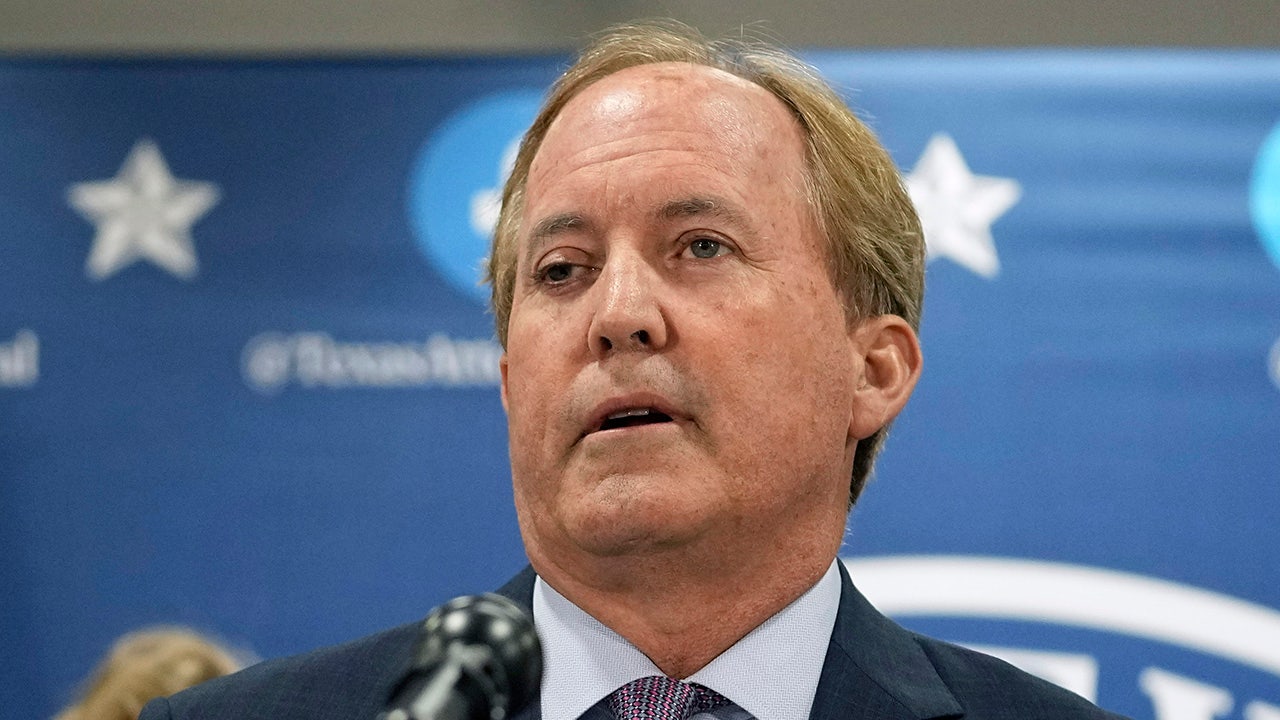

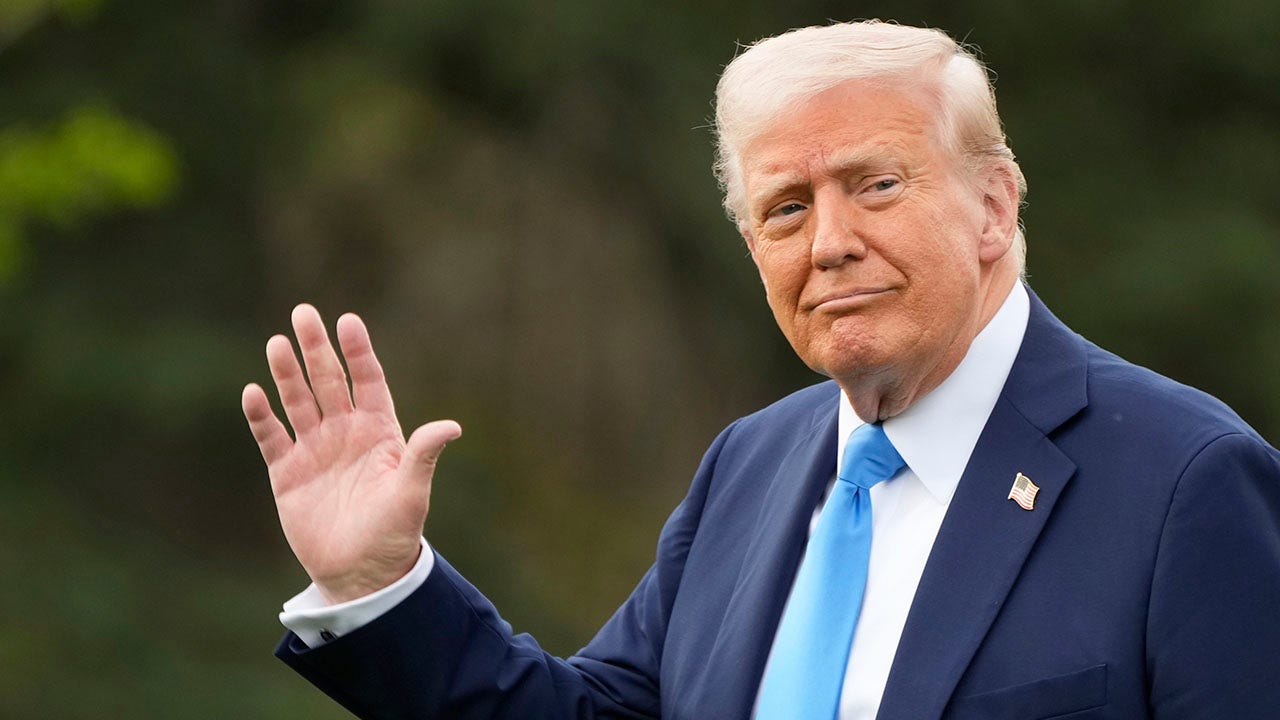
Pingback: Libya Gate Showed Just How Unrealistic Are Isael’s Hopes for Normalizations with Arab States - Al Sarira